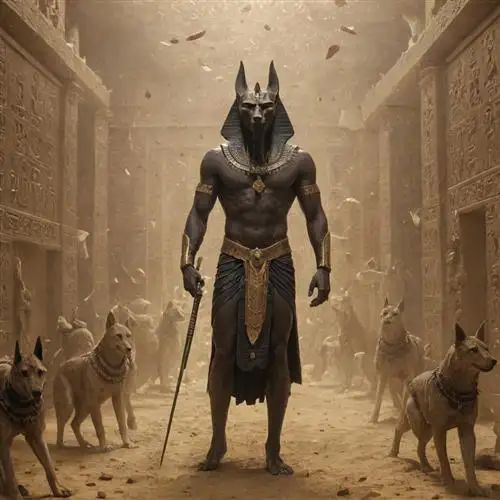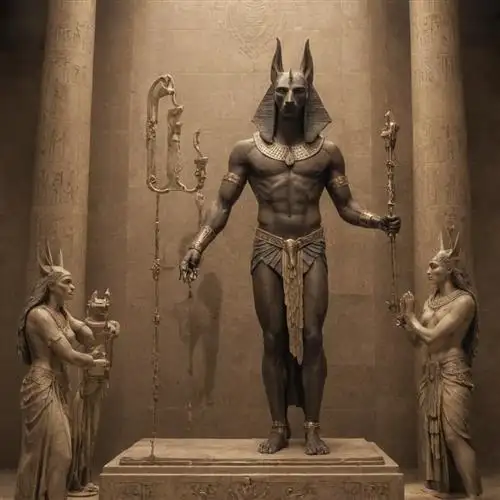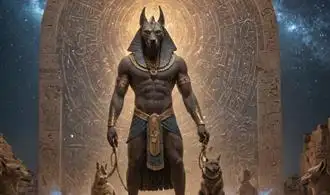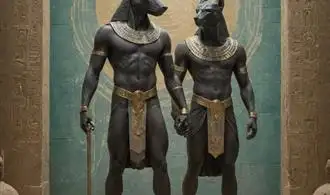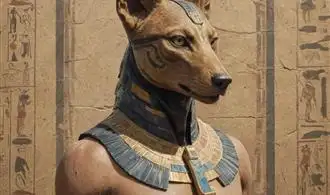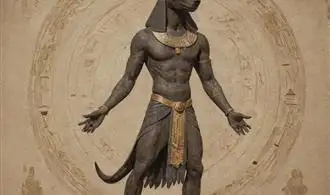
Anubis The Jackal Headed God
Anubis, the enigmatic jackal-headed deity, has long captivated the hearts and minds of those seeking deeper spiritual guidance. This ancient Egyptian god, associated with mummification and the afterlife, offers a profound and multifaceted perspective on the human experience. As a spiritual guide, Anubis' influence extends far beyond the confines of ancient Egyptian mythology, resonating with individuals across cultures and belief systems.
At the core of Anubis' significance is his role as the "Opener of the Ways," a guardian and facilitator of the transition from life to death. This profound responsibility grants Anubis a unique insight into the complexities of the human journey, from the physical realm to the metaphysical. By engaging with Anubis, one can seek guidance in navigating the liminal spaces between the material and the divine, fostering a deeper understanding of the cyclical nature of existence.
Anubis' association with the jackal, a creature revered for its adaptability and keen senses, further underscores the god's ability to navigate the unseen realms. The jackal's keen eyesight and acute hearing are symbolic of Anubis' heightened perception, granting him the capacity to perceive the subtleties and nuances that often elude the human eye. This metaphysical acuity allows Anubis to serve as a bridge between the physical and spiritual worlds, guiding the devotee through the complexities of the afterlife and the transformative process of death.
Beyond his role as a psychopomp, Anubis is also celebrated for his association with mummification and the preservation of the physical body. This aspect of the god's domain speaks to the importance of honoring the physical vessel that houses the soul, as well as the significance of acknowledging the profound transition that occurs at the moment of death. By aligning with Anubis, one can cultivate a reverence for the sacredness of the body and the inherent power of the physical form to serve as a conduit for spiritual growth and transformation.
Anubis' multifaceted nature extends to his symbolism and iconography, which have been interpreted and reinterpreted throughout history. The god's distinctive jackal-headed form, often depicted with black fur or skin, is a potent symbol of the duality that exists within the human experience. The black color, associated with the fertile soil of the Nile and the depth of the underworld, represents the profound mysteries and transformative potential that lie within the realms of the unseen.
The Symbolic Importance of Anubis
Anubis, the ancient Egyptian deity associated with mummification and the afterlife, holds immense symbolic significance that extends far beyond his role as a funerary god. As the jackal-headed protector of the dead, Anubis represents the critical transition between life and the next world, guiding the souls of the deceased and ensuring their safe passage to the afterlife.
At the heart of Anubis' symbolism is the concept of transformation and rebirth. The jackal, Anubis' animal form, was believed to inhabit the liminal spaces between the world of the living and the dead, making Anubis a gatekeeper and mediator between these realms. This duality reflects the cyclical nature of life and death, a fundamental tenet of ancient Egyptian spirituality.
Anubis' role in the mummification process further emphasizes his symbolic importance. As the overseer of the embalming ritual, Anubis was responsible for preserving the physical body, ensuring the soul's successful transition and the deceased's ability to continue their existence in the afterlife. This process of preservation and transformation is a powerful metaphor for the cyclical nature of existence, where death is not an end, but a necessary step towards rebirth and renewal.
Moreover, Anubis' association with the scales of judgment in the Egyptian afterlife highlights his role as a guardian of morality and justice. In the ritual known as the "Weighing of the Heart," Anubis would weigh the heart of the deceased against the feather of truth, determining the individual's worthiness to enter the afterlife. This symbolism underscores the importance of living a virtuous life, as it is the key to achieving a harmonious and fulfilling existence beyond the mortal realm.
Anubis as a Guide to the Afterlife
Anubis, the ancient Egyptian god of the dead, has long been revered as a powerful spiritual guide, particularly in navigating the complexities of the afterlife. As the jackal-headed deity responsible for the embalming and protection of the dead, Anubis offers a unique perspective on the journey beyond this mortal realm.
One of the primary roles of Anubis is to serve as a guide for the deceased, ensuring their safe passage through the underworld and into the afterlife. This journey is fraught with challenges, both physical and spiritual, and Anubis is believed to provide the necessary knowledge and protection to overcome these obstacles.
Anubis is associated with the mummification process, a sacred ritual that was essential in preparing the deceased for the afterlife. Through this process, Anubis not only ensured the preservation of the physical body but also played a crucial role in the spiritual transformation of the individual. By guiding the soul through the complex rituals and rites, Anubis helped the deceased to transition into the next phase of existence.
In addition to his role as a guide, Anubis is also known for his impartiality and objectivity. As the overseer of the weighing of the heart ceremony, Anubis was responsible for determining the worthiness of the deceased. This process, known as the "Judgment of the Dead," was a pivotal moment in the afterlife journey, and Anubis was believed to judge each individual's actions and deeds with unwavering fairness.
Connecting with Anubis for Spiritual Guidance
Anubis, the ancient Egyptian deity associated with mummification and the afterlife, can be a profound spiritual guide for those seeking deeper connection and understanding. As the god of the dead, Anubis holds a unique and powerful role in the spiritual realm, offering guidance and protection to those navigating the complexities of life and the mysteries of the beyond.
To connect with Anubis, it is essential to approach this divine figure with reverence and an open heart. Anubis is not merely a historical figure but a living, breathing presence that can impart wisdom, clarity, and transformative insights. By engaging in regular meditation, ritual work, or simply quiet contemplation, individuals can forge a personal relationship with Anubis and invite his influence into their lives.
One of the primary ways Anubis can offer spiritual guidance is through dream work and intuitive communication. As the guardian of the underworld, Anubis has a deep understanding of the subconscious and the realm of the unseen. By seeking Anubis in dreamscapes or through divination practices, individuals can receive messages, symbols, and insights that can shed light on their current challenges, emotions, and spiritual growth.
Additionally, Anubis can serve as a powerful ally in the journey of personal transformation and healing. As the deity associated with mummification, Anubis can guide individuals through the process of shedding old patterns, beliefs, and identities, allowing them to emerge reborn and rejuvenated. By invoking Anubis during times of transition or inner turmoil, seekers can find the strength, courage, and clarity to navigate the complexities of their lives.
Furthermore, Anubis can be a profound guide in the exploration of the afterlife and the mysteries of death. As the keeper of the scales that weigh the hearts of the dead, Anubis holds a deep understanding of the process of dying and the journey of the soul. By connecting with Anubis, individuals can gain insights into the nature of the afterlife, the significance of the psychopomp role, and the importance of honoring the dead.


